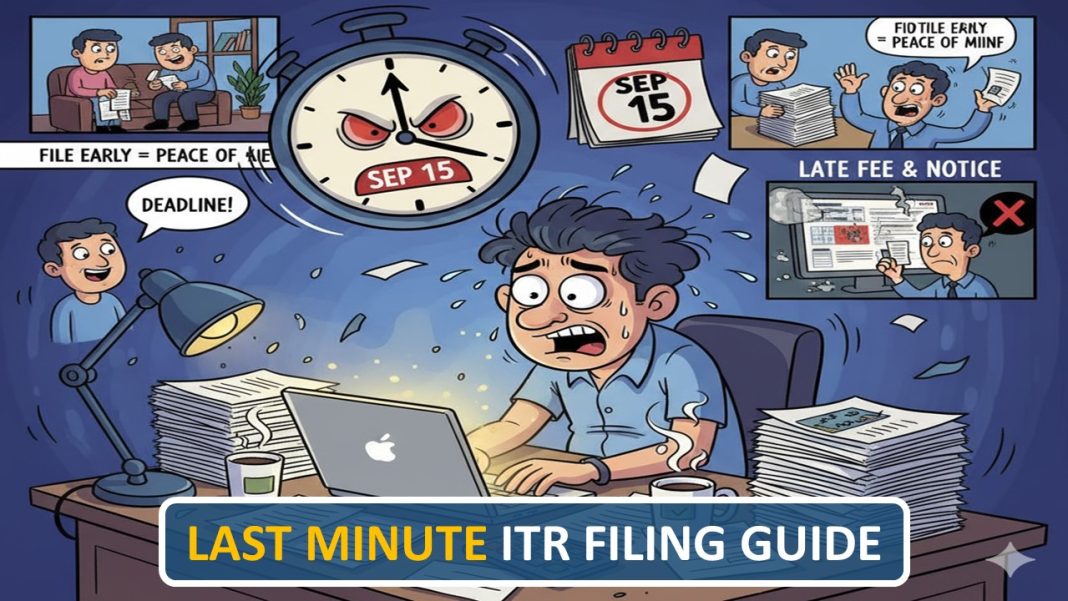ITR Filing Deadline Approaches: Last-Minute ITR Filing Guide
The due date for filing Income Tax Returns is September 15, 2025 for the non-audit taxpayers. The taxpayers only have 2 days left to file their ITR. While many taxpayers are still waiting for the extension, experts suggest not waiting for the extension. Filing your ITR after the due date will attract a penalty and interest. Therefore, if you are someone filing ITR during these last two days, here is an important last-minute ITR filing guide.
Report Mutual Fund Gain Correctly
For the debt Mutual Fund units bought before 1 april 2023, if you sold them before 23 July and held them for more than three years, the LTCG rate would be 20%. But if you hold them for a shorter period, the STCG rate would be applicable as per the slab rates. Similarly, if they are sold after 23 July 2024, holding for 2 years, the LTCG rate will still be at 20% and the STCG rate will be the slab rates.
However, if units are bought after April 1, 2023, the gains will be taxed according to the slab rates no matter how long you hold them.
Reporting Equity Sold Before and After 23 July 2024
If the equity units are sold before 23 July, 2024, the LTCG, if units are held for 12 months, is taxed at 10%. If the equity is held for a shorter period, the STCG rate would be 15%.
For sales made on or after July 23, 2024, the LTCG are now taxed at 12.5% (with a 12-month holding period) and short-term gains are taxed at a higher rate of 20%.
Taxpayers must note that the first Rs 1 lakh/Rs 1.25 lakh of the gain is tax-exempt, but full gains are to be reported.
Extra Details Required Under Old Tax Regime
If you are filing the return under the old tax regime, you must know that for this assessment year, the income tax department has added additional disclosure requirements in the ITR forms.
HRA (House Rent Allowance) Claim: You need to report the following things:
- your place of work,
- actual HRA received,
- actual rent paid,
- your salary details, including basic salary and Dearness Allowances
Supporting documents such as rent agreements and CTC annexures are also required.
Home and Education Loan Interest: Regarding the Home and Education loan interest, you must report
- loan sanction date,
- loan account number,
- amount disbursed,
- closing balance as of March 31.
For home loans on rented property, these details are also mandatory. Documents like sanction letters and loan statements must be attached.
80C Deductions: Now you will be required to give the following details to claim the deduction under section 80C:
- Identification number of investment
- PPF account number
- Term insurance policy number
The required documents are PPF and insurance policy statements and receipts of ELSS.
80D Health Insurance: If you are claiming the deduction under Section 80D, you must report the following details:
- Insurance policy number
- Name of insurer
You will be required to submit the policy receipt as well.
Look for AIS Errors
The Annual Information Statement (AIS) often shows errors; therefore, you must carefully check the errors for:
- Equity Capital Gains: Sometimes, the brokers or depository or AMC make duplicate entries, which show inflated sale value. There can also be a mismatch in the sale price reported by the depository and broker as per the settlement time.
- FD Interest: The full interest is sometimes shown as the income when the FD matures, even though it is taxed annually. This causes mismatch and errors.
- Joint Assets: the entire sale value of property and mutual funds gets attributed to each co-owner, inflating the net income for all owners.
- SGB (Sovereign Gold Bond) Interest: This interest is taxable under “Income from Other Sources”, but sometimes it does not appear in AIS or Form 26AS.
The solution is that you should report the correct income and not as per the erroneous AIS. If you see errors, go to the AIS portal, check under the “View AIS” option, and report using the “Feedback” option. Do not wait for AIS to be corrected later; file your ITR on time.
Common Mistakes to Avoid
These are some common mistakes that taxpayers often make:
- Forgetting mandatory disclosures in Schedule FA (foreign assets) or Schedule AL (assets and liabilities).
- Choosing the wrong ITR form. For example, you can use ITR-1 only if your equity long-term capital gains are up to Rs 1.25 lakh, and not if you have other complex gains.
- Not correcting mistakes in AIS.
- Missing the filing deadline, which can lead to interest, late filing fees, and problems with refunds.



